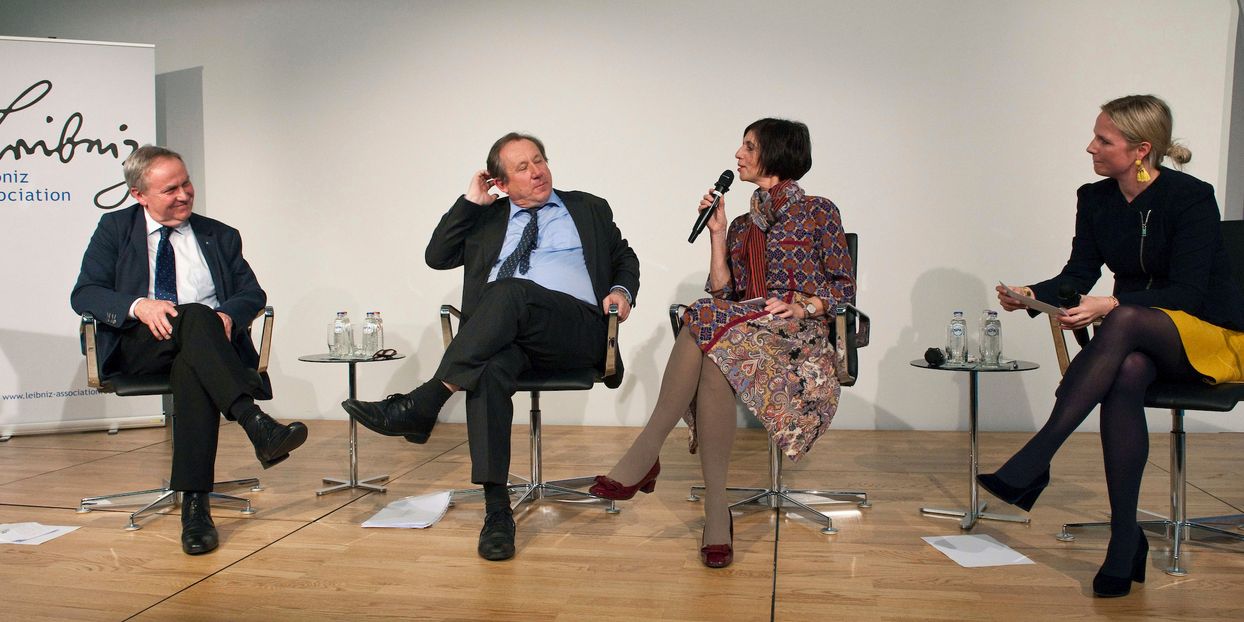
Was Grundlagenforschung (noch) damit zu tun hat: Transnationale Forschungsförderung zur Bewältigung gesellschaftlicher Krisen in Europa
Crisis Talk on 24 January 2018
The 7th Crisis Talk was not only about the question of what contribution science can make to overcoming social crises. The discussion also focused on a crisis phenomenon which, as Prof. Dr. Nicole Deitelhoff (PRIF) emphasized in her welcome address, is not even perceived as a crisis by some people. What was meant was the role of basic research, which is on the defensive in European research funding compared to application-oriented research. At least this is how it is perceived by some observers. The question of the importance of basic research in European research funding is also particularly topical because the Commission proposal for the 9th Research Framework Programme (FP9) is expected in the summer.
The Leibniz Research Alliance "Crises of a Globalised World" took this as an opportunity to invite its partners - the Representation of the State of Hesse to the EU, the European Office of the Leibniz Association and the Frankfurt Cluster of Excellence "The Formation of Normative Orders" - to a debate on transnational research funding. With Prof. Dr. h.c. Jutta Allmendinger Ph.D. (Berlin Social Science Center), Dr. Wolfgang Burtscher (Deputy Director General of DG Research and Innovation, EU Commission) and Dr. Michael Metzlaff (Vice President Corporate Innovation R&D, Bayer AG), three high-ranking guests from science, politics and industry could be won for this Crisis Talk. Besides Nicole Deitelhoff, Mark Weinmeister (Hessian State Secretary for European Affairs) and Prof. Dr. Matthias Kleiner (President of the Leibniz Association) welcomed the numerous guests. While Mark Weinmeister praised the series of Crisis Talks as a tradition of the state representation in Brussels and also emphasised the position of basic research in the social sciences for the innovation society, Matthias Kleiner emphasised in particular the importance of the Leibniz Research Associations, whose work is both interested in knowledge and application-oriented.
Jutta Allmendinger's keynote speech initially underlined the importance of basic social science research for understanding social crises. Knowledge about the loss of social cohesion and how this can be countered is also an important prerequisite for the success of technological innovations. When funding basic research, it should be borne in mind that its actual relevance only becomes clear in a second or even third step. Therefore, a higher degree of openness and willingness to take risks on the part of the funding agencies is crucial, as well as funding instruments that are tailored to the potential of the researchers and, last but not least, that allow more time. In the discussion moderated by Charlotte Geerdink (Swiss Core), Wolfgang Burtscher demanded that it must also be the claim of the social sciences and humanities to actively participate in existing funding programmes. In her response, Allmendinger said that this presupposed that the social sciences and humanities were already involved in the phase in which the central questions and objectives of the funding were formulated.
Michael Metzlaff (Bayer) brought an additional perspective, pointing out that social science expertise is becoming increasingly important in a company like Bayer. For example, he said that it is very important for the company to be able to better assess the social acceptance of its products, such as genetically modified seeds, in advance. It was also interesting to note that from the perspective of a globally operating company, research funding programs not only provide financial incentives, but are also particularly relevant from a networking perspective. Finally, the audience asked the question whether some funding programmes simply did not allow enough time to initiate interdisciplinary projects. In this case, and Allmendinger illustrated this with the example of her institute's practice, a combination of time and limited resources was necessary to initiate such ambitious collaborations.
The Brussels audience was offered a lively and committed debate. The participants on the panel succeeded in highlighting the many aspects of a controversial topic without getting too lost in the details of research funding. The broad lines of European funding policy were made very clear, and it will be exciting to see how these lines will be further developed in the course of the year.
